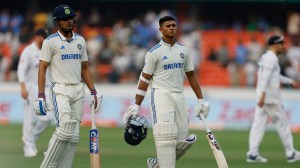Notwithstanding the violence, Gujaratis who live in Israel say they feel safe
At Petah Tikva city on Friday – when the first batch of 212 Indians evacuated from Israel landed in Delhi, as the conflict continued for the seventh day
 At Petah Tikva city on Friday – when the first batch of 212 Indians evacuated from Israel landed in Delhi, as the conflict continued for the seventh day – Savdas quietly went about his business, stocking his grocery store and welcoming customers amid odd sirens warning about approaching Hamas missiles.
At Petah Tikva city on Friday – when the first batch of 212 Indians evacuated from Israel landed in Delhi, as the conflict continued for the seventh day – Savdas quietly went about his business, stocking his grocery store and welcoming customers amid odd sirens warning about approaching Hamas missiles. Savdas Mulyasiya (53), who had followed his brother Jivabhai to Tel Aviv in the 1990s, had just returned from Canada when on October 7, his daughter – who has done a two-year conscription in the Israeli Defence Force (IDF) – informed him of the attack by the Hamas on Israel. What Savdas witnessed later is what he describes as “violence of the scale he has never seen before” as a citizen of Israel for 27 years.
At Petah Tikva city on Friday – when the first batch of 212 Indians evacuated from Israel landed in Delhi, as the conflict continued for the seventh day – Savdas quietly went about his business, stocking his grocery store and welcoming customers amid odd sirens warning about approaching Hamas missiles.
Speaking with The Indian Express over phone, Savdas, who immigrated to Israel in 1990 and acquired an Israeli citizenship in 1996, said: “In our part of the city, sirens start wailing sometimes. But there has been no such warning for the last 48 hours and a semblance of normalcy has returned. Public transport is running and supply of daily essential items have not been affected so far. But the situation is horrible in areas along the border with Gaza strip.”
While Savdas’s children moved to Canada to study in August, with their mother, Jivabhai’s are in the US.
Before immigrating to Israel, Savadas was a farmer in Kothadi village in Junagadh’s Manavadar taluka. He was the second from the family to move to Israel. His elder brother Jivabhai had immigrated to Israel in 1986 and got Israeli citizenship in 1992.
Savdas runs a grocery store each at Petah Tikva near Tel Aviv, the commercial hub of Israel, and Jerusalem, the national capital and 98 km away from Sderot, the Israeli city on the Gaza border. He’s also a partner in two other similar stores.
 The Gujaratis at a grocery store in Jerusalem.
The Gujaratis at a grocery store in Jerusalem.
He said that Israelis have always lived on the edge but he has not seen violence on such scale. “Warnings of approaching missiles and rockets is nothing new. Never two consecutive months pass without one sort of violence or other. But I have not seen such violence in my life. The situation is terrible in areas along the border. The feeling here is that this is worse than the Holocaust as Hamas militants are not sparing even pregnant women, children and elderly.”
Savdas, who didn’t go for higher education after studying science at high school, added: “Israel has suffered such casualties in the 1967 war. But those casualties were over a period of six days and mostly soldiers had fallen. But this time round, they killed a similar number of civilians within six hours. One senior officer of the Israeli secret service who used to live in Petah Tikva is among the casualties. Therefore, Israelis are very very angry.”
He said that Hamas militants struck when people were celebrating the last day of the week-long Feast of Tabernacles, a festival of harvest. “People pitch tents during the festival, get together to celebrate and pray. Hamas struck early in the morning when many soldiers were praying, unarmed,” said Savdas.
“I returned from Canada on October 3 after making arrangements for daughter Riya, sons Shivam and Rahul to study there and for my wife Rina to stay with them. But on October 7, my daughter called me from Canada and woke me up, asking if I was asleep in the bunker or in my bedroom… she told me that her friends in the IDF had alerted her about the attack by Hamas.”
Incidentally, Riya’s two-year-long conscription had ended in July. Jivabhai’s 22-year-old daughter Nitza, too, had completed her draft around a year ago and has since moved to the US for higher studies. The two cousins were the first persons of Gujarati origin to serve in the IDF, Jivabhai said, adding they were with the forces during clashes between IDF and Hamas militants in May 2021.
Savdas said the violence has remained limited to up to 10 km on the Israeli side of the border with Palestine at Gaza Strip. He added that the 2,000-odd Gujaratis, mostly from Saurashtra, working as caregivers to the elderly in Israeli don’t feel threatened. “Those who are being evacuated by the Indian government are mostly tourists and students as well as those working in Israel who had already planned a trip back to India but their flights have been cancelled,” Savdas said.
 A Gujarati on the streets of Jerusalem.
A Gujarati on the streets of Jerusalem.
The caregivers agree. “I came to Israel as it offers the best wages and security. The violence notwithstanding, I feel Israel is the safest country. I would stay put and wouldn’t mind even serving on the frontlines,” said Raju Odedra (35), a native of Kuchhdi village in Porbandar, who has been giving care to an 88-year-old Israeli in Jerusalem for the last nine years.
“My monthly salary as a caregiver here is higher than what I would earn in a year in India,” he added. Odedra used to run a general store in Kuchhdi. His brother Savdas Odedara is also a caregiver in Israel while his wife, two children and parents are in Kuchhdi.
Mukesh Karena (37), a native of Pachhtar village in Devbhumi Dwarka’s Bhanvad taluka, has been working as a caregiver in Bat Yam city. “There is tension on the border but in our parts, things look normal more or less. It is just like violence in Jammu and Kashmir and the situation in the rest of India,” Karena said. “…every building in Israel has a bunker or safe room and we move there as soon as sirens start wailing,” he added.
In Petah Tikva, Raju Kuchhdiya, manager of Savdasi’s grocery store, said that customer footfall has remained normal. “There is no rush from people to stock essential items. The customer flow is normal… I ride a Metro to reach our store and I haven’t felt any threat so far,” said Kuchhdiya, a native of Kuchhdi, who has been working in Israel for six years.
Besides the caregivers, Jivabhai said, around 30 Gujarati families associated with the diamond business also live in Israel.
In Gujarat, however, the families said they are concerned. “They tell us they are safe and that the war zone is some 40-45 km away. But Israel is a small country and therefore, one remains worried,” said Keshubhai, the second brother of Jivabhai and Savdas.
Jivabhai said his children Nitza and sons Rit and Adip are in distress. “One of Nitza’s friends, the daughter of our neighbour and Nitza’s comrade during her draft, is among those killed after terrorists attacked a music party in Be’eri Kibbutz,” he added.












